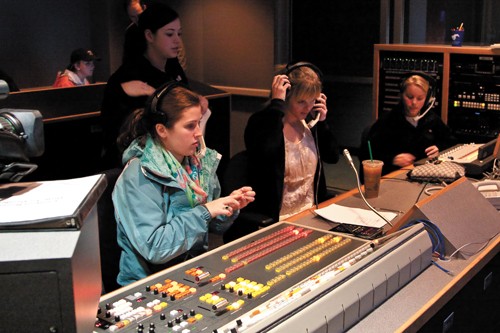
Student members of the SMU Department of Journalism’s Daily Update broadcast working on Monday mornings edition. (Michael Danser/ The Daily Campus)
Most SMU students take about four to five classes each semester. Along with this load of work, many students are involved in time-consuming organizations, such as sororities or fraternities. Some students also have jobs outside of their campus commitments that may consume more hours than schoolwork.
How do students successfully manage all of these responsibilities? Juggling classes, work and extra-curricular activities certainly can be a struggle.
A typical day for many SMU students is similar to the schedule of Erik Burgos, a senior mechanical engineering major. Burgos wakes up and goes to class around 9 a.m. until noon, has a quick lunch and checks his e-mail before heading off to work.Burgos works from 2 p.m. until 6 p.m. then goes to his fraternity meeting from 6:30 p.m. to 7:30 p.m. and finally returns home to complete pending assignments until about 2 a.m.
Such a crammed schedule is stressful, but, like Burgos, many students see the benefit of having a job in college, outside of the extra cash: opening the door to future job opportunities and networking.
“I think the other thing that keeps me from breaking this busy momentum is the incredible networking curve that you can reach when you intentionally make an effort to meet new people and seek new opportunities,” Burgos said.
The money that many students earn is for essentials, such as food and clothes. Nevertheless, for many SMU students, a job creates a further learning experience. Many of the jobs students have are for the purpose of learning about the career field they want to enter.
For other SMU students, having a job is financially necessary to pay bills and rent, as well as a learning experience. “I have expenses I need to take care of, and especially being at an institution such as SMU, you often find yourself barely getting through the semester financially,” Burgos said.
Whatever the case may be, maintaining a job and keeping up with all other activities requires time management.
“I am a firm believer in keeping a detailed agenda or calendar and constantly updating and following up with it,” Burgos said.
For Burgos, time management is the key operator in having a job while keeping up with schoolwork and other activities. As one of the amenities of SMU, the Altshuler Learning Enhancement Center provides guidance in developing a system of time management.
Even though working replaces non-productive activities like watching television, students learn and grow from a new experience that they otherwise would not have had. Such is the case of Burgos who says that his work gives him a learning experience that he otherwise would not have had with any other occupation. Students who work to gain experience have hopes that once they graduate they will stand out when measured against other students.
“You have the experience with people, you’re familiar with the process of working and you have connections,” junior Elizabeth Zamora said.
While working, students have to prioritize their daily activities. Having to do many things with a limited amount of time means that students must give up leisure time. However, this helps to structure and discipline an individual.
“The student matures sooner. The student learns that there is a double system and they have no time to lose,” Spanish professor Verónica León said.
“Work experience shows that, that individual is capable of working. They have a track history of what they’ve done,” area coordinator of Group Excellence Justin Lee said.
Students can find a job through their college advisors and through the Hegi Family Career Development Center. The Hegi Center helps with resume building, interviewing skills and other job-hunting tools.








